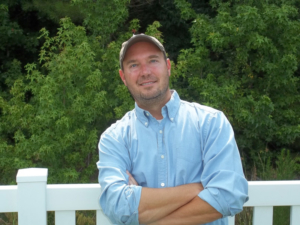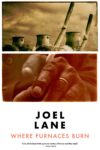 Following his debut collection, Rabbit Punches, Jason Ockert’s Neighbors of Nothing offers ten stories about isolation, grief, and the inability to find oneself in familiar and unfamiliar places. Stories like “Jakob Loomis” and “Everyday Murders” exemplify the collection — the density of the Southern landscape intertwines with the emotional, spiritual and psychological topographies the characters struggle through. “Jakob Loomis” gives us three different characters who find themselves horrifically entwined in the wake of a child’s kidnapping, and in “Everyday Murders” the lone survivor of a mass violent crime tracks down an entrepreneur selling football jerseys portraying serial killers’ names.
Following his debut collection, Rabbit Punches, Jason Ockert’s Neighbors of Nothing offers ten stories about isolation, grief, and the inability to find oneself in familiar and unfamiliar places. Stories like “Jakob Loomis” and “Everyday Murders” exemplify the collection — the density of the Southern landscape intertwines with the emotional, spiritual and psychological topographies the characters struggle through. “Jakob Loomis” gives us three different characters who find themselves horrifically entwined in the wake of a child’s kidnapping, and in “Everyday Murders” the lone survivor of a mass violent crime tracks down an entrepreneur selling football jerseys portraying serial killers’ names.
But Neighbors of Nothing is also about fathers and fatherhood: loss, estrangement, and its terrifying newness. One of my favorite sentences comes from the first story, “Into The Dead,” and captures the essence of Ockert’s voice:
“There are kinds of kindness better suited for people different than my father and me. My father’s wife should squeegee the bigness of her swollen heart into the mouths of the needy, neglected children, maybe veterans of foreign wars.”
The final story, “Echo,” is a well-crafted and moving 2nd POV that describes the daily routine of a man coping with Alzheimer’s and its significant and unforgiving symptoms of the heart, as much as those of the mind. I found it to be the gem of the book. And, as Ockert notes, the story has taken on an importance beyond its pages.
If it was possible to capture all the stories of Neighbors of Nothing in one sentence it would be one from “Everyday Murders”: “But you are no role model when nobody sees you. You are inconsequential. Drop in a bucket.”
I spoke with Ockert about the development of his style, the craft of the short story, and the role of the South in his stories.
Zachary Tyler Vickers: To start, I’m a huge fan of your first collection, Rabbit Punches. Neighbors of Nothing builds on your signature style and humor. How has your aesthetic developed since? How do you view the two books differently, and what did you hope to accomplish new with Neighbors of Nothing?
Jason Ockert: Most of the characters in Rabbit Punches find themselves trying hard to belong (and mostly failing at it). They are misfits and outcasts and believe that companionship might help abate the ache of loneliness.
Many of the characters in Neighbors of Nothing are trying hard to let go. They grapple with personal loss. The instinct to make individualized grief public is something I found myself drawn to, for some reason, when writing these stories. It’s the idea that comfort can be found in a community. “We” overcome, together. For example, in my story “Max,” the mother joins an organization called Mothers Against Crows and hunts the birds because she believes, at least in part, that the crows contributed to the death of her son. In a different story, “Still Life,” one of the main characters develops an Adopt-a-Railroad initiative in an effort to salvage his tenuous relationship with his girlfriend. In “Piebald,” the narrator joins a Taps troupe which performs a military-style ceremony for deceased war veterans. While shouldering the burden with others provides temporary relief, the nuanced ways in which these characters realize that they are alone drives the sentiment in the collection.
I think what has changed the most aesthetically is my unwillingness to let go of the reins and let the story gallop ahead of me. The stories in Rabbit Punches were somewhat unruly, for better or worse, and part of the thrill was letting the whimsy of the characters guide me. That’s different in Neighbors of Nothing. I am, perhaps, a more patient writer now. It’s hard to say if the shift in subject has induced the change in my writing or if my writing has guided me to this more contemplative meditation on loss.
That reminds me of the David Shields quote: “Write yourself naked. In exile. And in blood.” Then there’s that quote by David Foster Wallace where he expresses the need for the writer to estrange from him- or herself in order to work. Where is the balance in referencing personal experience and removing yourself from it?
The way I see it, the only truth a fiction writer is bound by is an emotional one. An underrated asset to a writer is his/her ability to feel. Poets know this sublimely. I like my artists a bit unhinged; uncomfortable in their bodies.
I find that I’m working best when I’ve got my ego in check. Personal experiences and adhering to an autobiographical impulse feels restrictive to me, at best, and lazy at worst. It’s akin to describing a season out of season. Any old fool can look out the window in summer and describe the way the sun beats down upon the scorched lawn. It requires more work to depict the quiet accumulation of snow upon a weather-beaten park bench when you’re sweltering at your writing desk. Part of what I try to do is leave this world when I write so that I might inhabit a better one. Or, maybe more honestly, the desire is to occupy a landscape of my own making wherein which I have a modicum of control. Here, in the real world, anything can happen and that’s scary as hell.
How did you discover your voice and style? Who influences and inspires you?
My mentors, among others, were Padgett Powell at the University of Florida and George Saunders at Syracuse University. Powell demonstrated how a story is a celebration; how it can explode. In the land of the narrative, discourse is king, and, back then, I practiced my pyrotechnics. Saunders explained that in order to break someone’s heart you have to shore up your own first.
A writer’s style — his/her voice — is earned over time. While it’s true that a writer will become distinctive at the sentence level, I believe that a person’s philosophy, his/her worldview, also factors into the equation. For me, I try to craft sentences that swagger and to temper them with characters and situations that are humbling.
The title, Neighbors of Nothing, comes from Mark Strand’s “Elegy for My Father,” which you use as the epigraph, introducing themes of isolation and general lost-ness. But, to me, it’s another nod at fathers. This collection is about fatherhood, the new, the old, the begrudged, the honored. I’m thinking, specifically, of “Into The Dead” and “Sailor Man.” What is driving this collection to you?
Fatherhood is familiar emotional terrain for me and, in that way, I often find myself drawn to it. My own father left when I was young and, of course, it had a major impact on me. For years I wanted to know why he left, naturally. Back then the reason mattered. When I was younger I didn’t fully understand the difference between absence and loss. I overcomplicated my pseudo-relationship; created narratives to fill in the blanks. If I wasn’t provided a reason, by God I’d make one up.
Now, though, there’s little mystery anymore. My Dad’s fine. He’s trying to get by like the rest of us. The fathers that crop up in Neighbors of Nothing are invented. (If they resemble my actual father, it isn’t intentional.)
The subject in the poem, “Elegy for My Father,” is a man that I don’t know, but it’s about a feeling, an emotion, which had a profound impact on me when I happened to be in attendance at a Mark Strand reading.
In some ways, and this might not make sense, I have written these stories as a possible bit of solace for a future version of myself who will, invariably, experience loss. In the poem, Strand writes, “There is no thread to lead you back.” These stories are, perhaps, my threads. It is my hope that they might lead readers to something impactful, too.
I remember you telling me that when you were a kid you’d just watch people and invent stories for them.
Yeah. That’s true. Hopefully not in a creepy way, though.
What I used to do is watch people as a means of figuring them out. I started working at a young age — around twelve — and to pass through the drudgery of the job I’d study folks, try to read them. When a person exhibited a pattern of behavior that I couldn’t predict, I’d file it away so that the next time I saw him or her, I’d be able, as the persona in T.S. Eliot’s “The Love Song of J. Alfred Prufrock” observes, “To prepare a face to meet the faces that you meet.”
When you’re younger there are so many mysteries in the world. It’s why literature is valuable at an early age. Hell, I likely read that Eliot poem when I was in ninth grade. As I’ve gotten older it has become more difficult to be surprised. The key is to stay curious. To believe that everyone you meet is carrying a fantastic secret. If and when people become dull to me I’d better find a different occupation.
You once mentioned that you find your character names on tombstones. Was there really a Therm, a Grumman, a Jakob Loomis? I’m curious to know more about your character development, specifically your use of quirks.
Cemeteries interest me because they are so visceral. You stand over someone’s bones (a name is provided) who existed for a period of time (dates etched in stone or marble), with a snippet of prose in the form of an epitaph. It’s not hard to concoct a story for the deceased in the dirt. What’s difficult is manufacturing empathy for a stranger.
I strive to walk the line between creating characters that are relatable yet distinctive. This includes names. Since I’ve never met Therm before, you likely haven’t either. We are getting to know him at the same time.
A great part of the thrill in writing is coming up with ideas that should not really “work” and still making them organic to the story. It’s a little like that game children used to play (maybe still play) called, King of the Hill. The objective is to stand on top of a hill and stay there as other kids climb up and try to knock you off. The last person standing is the victor. That’s how I write: I come up with a conceit, set it upon the hill, and try to knock it down with all the reasons why it shouldn’t work and something else should. Eventually, I’m left with the story. I can tell you that many fine quirks don’t make the cut.
The short story seems to be making a resurgence. I’m hopeful having seen the recent praise of short story collections like those from Wells Tower, Karen Russell and Junot Díaz (the latter two having celebrated Neighbors of Nothing). This collection ranks right up there with theirs. So I wonder, what draws you to the short form? Do you think the short story is resurrecting? Why should we value them?
Short stories are powerful motherfuckers. They can punch you right in the mouth. I don’t believe stories need us; we need them. I write in service of the art because so many writers (including the ones you’ve noted) have moved me fierce and I am indebted.
Short stories may lend themselves to a general shift towards shorter attention spans what with all the noise we let into our lives. I’d argue, though, that you should pay closer attention when reading a short story than when reading longer form. Like you, I’m also hopeful that the form is catching on if for no other reason than to shed light on all kinds of talent rising up and out of young writers.
Can you elaborate more on the service of the art? How much does our need for stories play into the art of writing? The short form seems to be less forgiving than, say, the novel. And so, does the art change from form to form?
I don’t write to create art. Art doesn’t need me. When you commit yourself to the act of writing you are, implicitly, entering a forest in which other Writers loom. There’s Hemingway, there’s Faulkner, there’s Joyce, there’s Twain and you (me) are nothing more than a desiccated seedling in loamy soil stretching desperately for a ray of sunlight. Plenty of talented writers have been overwhelmed by these implications and decided to do something else with their time. Then there are others, like me, who just crash through the branches.
What I love about writing short stories (the revision process) is precisely what I despise about writing a novel. A good first draft raises important questions which you can then begin to answer. If you ignore the questions and rush the piece, it will show. (Trust me, I’ve tried to skimp.) A short story draft is typically twenty or so pages whereas a novel draft is two hundred and fifty pages or more. I’m inspired to get back into a short story and sharpen sentences and happily dig in. With a novel, the thought of going back and starting from scratch is enough to send me scurrying under the desk. Novel-writing requires a working-class discipline that involves an attitude of punching in at the beginning of the day and punching out at the end. On the other hand, I can carry an entire short narrative around with me in my head (our brains operate with snippets of story in mind; it’s how we recollect and how we explain) as I go about my life and, when I should be listening, I’m working out kinks in the story.
The story is less forgiving than the novel because of its immediacy. A reader knows early on whether or not he or she is moved by a short story. It can take several chapters and a committed investment in a novel before the reader knows how he or she feels about it and by that time, since you’re already half-way through, you may as well go ahead and just finish it. The question is whether or not the reader will remember anything, down the line. A reader has a greater chance of remembering a narrative (short story or novel) when he or she is emotionally invested.
The South is a character in your stories. You mention growing up in the South. How did this influence your work? Why is it such a fertile territory for fiction?
If I were to chart my southern influence I’d trace it to Flannery O’Connor’s short novel, Wise Blood. That book incinerated me. I’d been bumbling around the world thinking I knew a little something about something until, pow, that strange and crazy story. In it, our man Hazel Motes, an atheist who isn’t really an atheist, creates the Church Without Christ (“. . . where the blind don’t see and the lame don’t walk and what’s dead stays that way,”) and preaches his “anti-religion” from the hood of his car. It’s Haze’s passion and idiosyncrasies and absolute refusal to be a part of something that’s phony that makes him so memorable.
If I belong anywhere it’s to The South Without The South. I can’t, with good faith, claim the region as my own. I’ve bounced around too much to have deep roots and I think the South proper requires deep roots. South Florida and Myrtle Beach (where I am now) are places that are filled with transients and misfits and all kinds of lovely characters who defy geographic stereotypes. If, though, one of the main ingredients in southern writing is a celebration of the downtrodden with sentences that carry rhythm and soul, then, if folks will have me, sign me up.
Though, “Max” is an exception to the Southern terrains. It takes place in Upstate New York. Do they really have an annual crow hunt?
They used to have an annual crow hunt in Auburn, New York, back in 2005. I don’t know if they still do. Back then I had a long commute from where I lived near Rochester, New York down to where I taught in Ithaca which gave me plenty of time to drive and think. I heard about the crow hunt on the radio as I passed a pumpkin patch. The mood had time to settle over me as I zipped back and forth, back and forth. Similarly, there really was a fire that burned up over 30,000 acres of forest near Conway, South Carolina and forced me and my family to evacuate in the middle of the night. Damned near lost the house. The stink of the fire penetrated.
Sometimes characters rise out of the landscape for me and other times I situate characters into landscapes. There’s no real formula I follow. I find it best not to second-guess the process. I trust myself to know when something is working and when something is failing.
Each story in this collection is vibrant and unique, yet the collection builds on itself toward the final magnum opus, “Echo.” How did you go about organizing the stories? What should a story collection do?
I tried to arrange the stories in an order that indicates an over-arching transition from youthful compulsion — raging against circumstances — to acceptance and contemplation. My hope is that the pieces, read together, offer a deeper insight into the ways people struggle to exist with purpose.
That’s the trick to living, of course, determining why we live. I certainly don’t purport to have answers, but in these stories I try to explore the questions in new ways.
What story was the most difficult to write and why?
At some point each and every one of these stories felt impossible to get right. You start out with all of these cool ideas for the piece and, invariably, the work of crafting sentences decapitates the conceit. The story-teller in me wants a high-octane event. There’s a part of me that wants to be able to answer the question, “What is your story about?” without doing what I did above: ‘. . . deeper insight into the ways people . . . blah, blah, blah.’ I want to say, “It’s about reanimated roadkill!” and mean it.
“Still Life” was the last story to make it into the collection and since it’s the newest it feels the most ornery to me now. I wrote the thing, let it sit, resurrected it again, fiddled, listened to extraordinary advice from the editors over at One Story, and finally tamed it into what it is today. The greatest challenge I faced was being true to one of my main characters, Everett Zurn, who is knee-deep in the high-school grind and is slipping right through the cracks. The apathetic version of my former seventeen-year-old self kept reminding me that I didn’t remember shit about what it was really like to have been who I was and so my “now” self dutifully tried and tried. The story is an offering to the ghost in me.
How did you decide on the use of 2nd POV in “Echo?” How does this strengthen the reader’s connection to the story, rather than 1st or 3rd?
“Echo” is the only story that I’ve written in second person and I arrived at that point of view after I discovered that first and third person perspectives didn’t read right. The story is about memory loss. We all experience memory loss. It’s universal. We just don’t experience memory loss the way someone with Alzheimer’s does. My goal was to try and insert the reader into the headspace of someone who is struggling to get through the day. I didn’t create the main character as an experiment; I didn’t invent him to put him into a petri dish so that readers who are not memory-challenged could feel pity for the crippling disease. Instead, really, I tried to do my best to honor a life-long love affair that my grandparents had which, I’d like to believe, transcended the lapses in memory that visited in the twilight of their lives.
I must say, while we’re on this topic, that unlike any other story I’ve written this one seems to have struck a chord with many readers who have, directly or indirectly, dealt with Alzheimer’s. I am gratified to know that it makes an impact.
“Jakob Loomis,” “Everyday Murders,” and “Max” have a sort of multi-tasking going on. Many of these stories subtextually nod at previous and impending tragedies, and incidental/accidental devastations. I’m wondering how you go about beginning a story like these and how you then layer them?
Writing is like traversing a frozen pond. You start on the edge where the ice is thickest, where you feel most comfortable. There are things in your wheelhouse that are firm; stuff you just know better than anyone. Then push out. Take risks. The thrill in writing comes when, at any second, the whole story could collapse. One false step and it’s over.
Alternating points of view (like in “Jakob Loomis,” “Still Life,” and “Everyday Murders”) is risky in a short story. If you’re lucky, you gain your reader’s trust and interest in one single character concerned with one single event. To suddenly ask a reader to focus on a different character engaged in another event in such a short span of time is dangerous. The payoff, if the story works, is an escalating tension and, ideally, a greater impact when everything ties together. If things are too neatly tied, the puppet strings show and you expose yourself for the hack that you are. If things are not tied tightly enough, the reader feels as if you are being coy and have wasted his or her time and you have, subsequently, exposed yourself as the cad that you are.
Tell me what’s in the hopper. What is/when is the next Jason Ockert joint?
I have written a novel, set on a vineyard, which is about alcoholism, the loneliness of aging, and brain-eating, parasitic wasps. It will be published in early 2015.
Zachary Tyler Vickers is a graduate of the Iowa Writers’ Workshop where he was the Provost’s Fellow and recipient of the Richard Yates Prize and The Clark Fisher Ansley Prize for Excellence in Fiction. His work has appeared in The American Reader, KGB Bar Lit Journal, Waccamaw, Hobart, H-NGM-N, HTML Giant, The Outlet and elsewhere.
This post may contain affiliate links.







